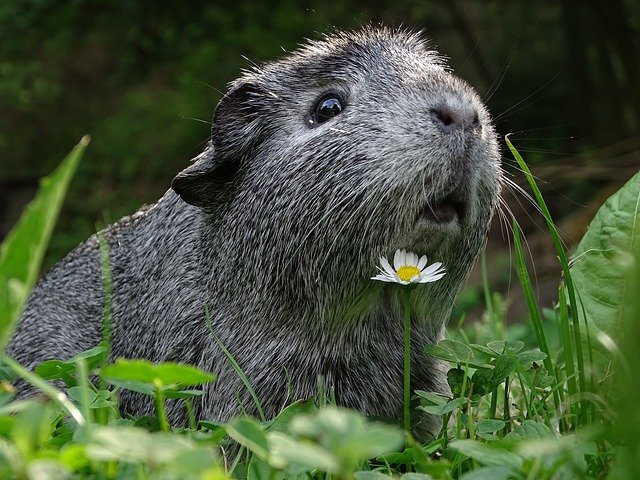How long do guinea pigs live? A perfectly valid question, and one you should know the answer to if you have guinea pigs in the family, or are considering adopting a few.
So, what is the life span of a guinea pig?
The life span of a domestic Guinea pig is 5-7 years, however with any living creature there are many factors that can contribute to this. They are known to live much longer than 7 years, just as the 2006 Guinness World Record states, the longest guinea pig survived 14 years, 10.5 months! While this record may not be the norm, Guinea pigs are certainly an animal that you need to provide with care and dedication, for many years. The better the care, the longer the life. It is common for a guinea pig to live for nine or ten years with special care. This means that Guinea pigs need a long-term commitment on your part.
Regardless of how well they are cared for, the thing that will have the biggest impact on the life of your pig will be the type. Some species tend to last longer than others. For example, a hairless guinea pig will live longer than a guinea pig with long hair.
It is important to note that the guinea pig is not a hamster. Many pet owners do not know the difference and think that these animals have the same life expectancies. However, they are actually very different! There are several species of hamsters and this can affect how long they last, but the average hamster can live for two to three years depending on how it is treated.
Guinean pigs, on the other hand, live much longer and grow to a much larger size and this is affected by a number of factors. how long will your guinea pig live? And the good news? You, the parent, play a very important role in lots of them! Let’s take a closer look.
Factors that affects how long a guinea pigs live
-
Food Quality
As human beings, the food that you feed your guinea pigs will directly affect their health and longevity. We have become increasingly aware of the link between healthy eating and illness, and this also applies to pets. Not just healthy eating, but the right kind of food in the right quantity.
Our little furry friends are called “pigs” for good reason. They have a healthy appetite. Very healthy food. What some people do not realize is that as long as the right food is fed, the guinea pigs control their own nutritious food themselves. They know how much they can eat and when to stop when they’ve had enough. So, make sure you always have plenty of pellets and good quality food in their living space. Guinea pigs also need fresh vegetables every day. They are graze animals, and they are accustomed to eating when they feel like it.
-
Mental Health
Yes. You have read that right. Mental health is a major factor. Do not leave a piggy by himself alone. He will not be having any fun time other than when you interact with him during a meal and a break, and he has no friend of his kind to “talk” to.
-
A living space
Guinea pigs need a living space of 8 square feet, whether you have one or two. They need to be able to stretch their legs and keep moving. Small animals, for example, can be seen forming “zoomies” where they will run from one point to another, pause for a few seconds, and then run back to where they started. Then repeat the pattern. The ability to walk properly will ensure that blood continues to flow smoothly through their feet. For example, inactive animals, either due to pain or lack of space, are (80%) more likely to develop the horrible suffering of “bumblefoot”. Staying active can prevent many illnesses from developing and the right amount of cage will make them happier.
-
Genetics
Some guinea pigs may have a genetic predisposition from selective breeding or in breeding. Selected breeding is used to bring about a particular physical feature such as hair color or hair length.
These guinea pigs have a beautiful, shiny coat. Unfortunately, satin Guinea pigs may be susceptible to Osteodystrophy, a painful and incurable vascular disease.
So, how long do guinea pigs live? It is usually 6-8 years old, depending on the quality of care. Always remember, the better the care, the better and often longer health.
-
Staying Warm
Another factor that influences how well your guinea pig can prevent illness is how warm they are. They are more sensitive to temperatures than other creatures. If they are too hot, then they can get heat stroke.
How long do guinea pigs live? Frequently asked questions about guinea pigs
-
How long do guinea pigs live, if they are properly cared for?
The life span of a guinea pig is from five to seven years. Just like humans, the life span of guinea pigs can vary due to many factors, including genetics, diet, and the environment. For example, guinea pigs that are not been given enough Vitamin C are prone to scurvy, which can be fatal, even in young pigs, while guinea pigs that feed on nutritious food will live longer, healthier lives.
As guinea pigs reach four to five years of age, owners often realize that they are starting to ‘slow down’ and health problems can start to develop.
-
What is the best housing option for a guinea pig?
Guinea pigs do very well when they live in a quiet area. Their fenced-off area should be located in a shallow area away from direct sunlight. Aquariums do not allow proper ventilation. Instead, use an enclosure with open space, plastic wires used by the sides. The enclosure should be about 30 x 36 inches in size for one guinea pig.
Also, it is best to provide an enclosure with solid floor covered with soft shavings. Wire floors or grates can lead to many skin and foot problems in guinea pigs. Provide at least one small box or shelter inside the enclosure to ensure your pig has a safe, hidden place to rest.
-
Regular veterinarian for regular check-ups?
Regular veterinary visits are important to keep your guinea pig healthy. Like dogs and cats, guinea pigs should see a veterinarian every six to 12 months for regular check-ups. During this trip, the veterinarian will ask about housing, nutrition, and other matters to ensure that the guinea pig gets the best care at home. The veterinarian will also perform a thorough physical examination, examining the general condition of the body, teeth, eyes and ears.
In addition to these general health visits, guinea pigs should be taken to a veterinarian whenever they show signs of illness.
-
Should my guinea pig be kept alone or with other guinea pigs?
Guinea pigs are social animals. For this reason, it is usually best to have two guinea pigs, if you have the space, time, and resources to do so. If you buy your guinea pig from a breeder or pet store, you can buy two guinea pigs that has been housed together from an early age. If you decide to include a second guinea pig later, it is important to introduce the two animals gradually and under close supervision, to ensure that they are compatible.
Also, make sure that both animals are of the same sex so that you do not get the complete waste of newborn guinea pigs that need care!
-
Guinea pigs are unique
While guinea pigs are a relatively common animal that is often seen in pet stores and recommended for children, it is important to understand that these animals are by no means require low maintenance. For a guinea pig to thrive, it is important to meet their nutritional, medical and social needs by providing proper care and knowing the needs of these unique animals.
-
Guinea pigs are social
Guinea pigs are very social and live very well with other guinea pigs. Keep them of the same sex to make sure you don’t have unwanted litters. Males can be kept together, as so as females without problems. Note that sometimes differences in animal behavior will mean that certain guinea pigs will not get along. Introducing them when they are little is the best way to find a pair, even though adults may not be brought in with care.
-
Guinea Pigs are sometimes quiet
Guinea pigs make a different sound of whistling, usually in anticipation of finding something they want or when they need some attention. Although it is not usually loud enough to annoy neighbors. If you are looking for an animal that will never interrupt a party or sleep in the afternoon, the guinea pig may not be for you.
-
Guinean Pigs are easy to tame
While guinea pigs may be nervous or aggressive at first, with kind, consistent treatment, overtime they become much easier. Careful management is required, and children should be supervised with them, but they are less likely to bite when stressed.
Did you know?
The Oldest Guinea Pig lived 14 years and 10.5 months old was named Snowball.
Conclusion
As you can see, getting a guinea pig is a great option if you are looking for an animal with a life expectancy of five to ten years. You contribute to your long, healthy pet by giving your guinea pig a nice house full of nutritious food and lots of friends. Take care of your guinea pig just as you would with a small child and you will do well as a parent of a guinea pig!







